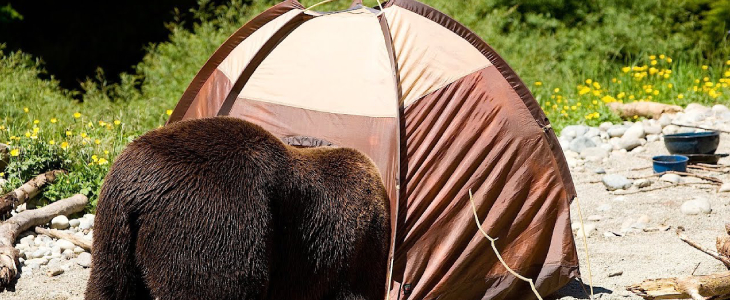
It goes without saying that there are risks when it comes to camping in bear country. In fact, on 14 April 2006 this risk became a tragic fact of life when a 6 year old girl received fatal injuries from a black bear while camping. Campgrounds are now having to incorporate policies and procedures to ensure bear conservation and safety for campers. The DEC Campgrounds in the Adirondack and Catskill Forest Preserves in New York State are two such campgrounds. Their staff have developed specific policies and procedures to minimize the occurrence of bear problems at their campgrounds while maintaining a healthy, natural black bear population. There are eight critical ways that you can minimise the chances of getting hurt by bears by following these simple tips:
1. Avoid traditional bear feeding areas.
2. Avoid camp locations where bears have been known to roam in the past.
3. Avoid camping where you may have trouble seeing a bear through vegetation.
4. Avoid camping where you see bear droppings and fresh tracks.
5. Never feed wild bears.
6. Store your food in a cooler which is locked in the car
7. Like most animals, bears are attracted to garbage so make sure your campsite is very clean
8. Remember that behind every cute baby bear is a very overprotective bear mother!
9. Stop fishing when bears are present. They want your fish more than you do.
10. The minimum safe distance from a bear is 50-100 yards. There are now a number of organizations that are working passionately on increasing bear awareness in the community.
The National Spokesman of The National Be Bear Aware & Wildlife Stewardship Campaign, General H Norman Schwarzkopf, is dedicated to providing teachers, college students, youth groups and guiding/hunting groups with educational materials and training programs to teach outdoor enthusiasts and residents up to date safety skills and techniques for camping, hunting, viewing, hiking, photographing and living with wildlife like bears safely and responsibly.

